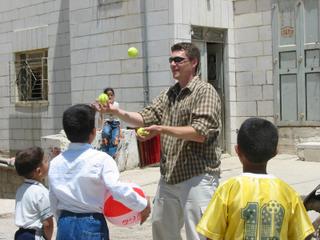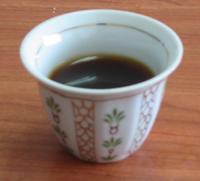I recently received two different emails asking for specific suggestions of thing you can do to support justice and peace for Palestine and Israel. Here are a few ideas:
1. Educate yourself and others about Palestine and Israel: Most Americans know very little about what is really happening in Israel and Palestine. Here are some ways you can help to educate people around you:
• Share the stories of people who have been to Palestine and Israel: The best way to learn about the situation in Palestine is to listen to the stories of people who have been there, especially told by Palestinians themselves. I will be available to speak starting in August and I’m willing to adapt my presentations to suit any group – I’m willing to tell the stories of the people I’ve met, talk about Palestinian nonviolence, focus on children’s issues or culture, give bible studies or whatever you’re interested in. As appropriate, I’m also willing to work with you to set up more creative presentations, like mock checkpoints. Whether you’d like me to speak in your home, your school, your faith community, or organization, I would be very happy to come! If you’re interested, comment or email me!
• Write letters to the editor: You can help improve media coverage of Palestine by writing letters your local paper. As you learn more about Palestine and Israel, write to letters to the editor of your local paper calling for peace and justice.
• Write, call, or visit your congress people: Our congress people need our help to learn more about the situation in Palestine. Currently, congress authorizes an average of 2.2 billion dollars a year in military aid to Israel. Contacting and visiting your congress people can help them understand why supporting the Israeli military prevents peace and give them the courage to support justice. I am happy to accompany you when you visit your congress people or help you prepare to visit them yourself.
• Support projects highlighting Palestinian people and Palestinian culture: Racism against Muslims and Arabs contributes to American support for Israel instead of Palestine. Projects that expose Americans to Palestinian culture and combat anti-Semitism (Both Jews and Palestinians are Semitic people!) are very important. Work with local Palestinians to organize projects like dinners, dance exposes, or film festivals. Projects also involving Jewish culture have the potential to be very powerful.
2. Take Action: Palestinians often ask me to share their stories with Americans, but they tell me that it’s even more important to take constructive action to end the occupation. Here are several campaigns and projects that I think are especially worth supporting:
• Campaign for Secure Dwellings: The Campaign for Secure Dwellings supports specific families living near Hebron who homes are slatted to be demolished by the Israeli army because they lack building permits, which normally take more than 10 years to obtain. CSD pairs groups, especially faith communities, with one of these families. Groups are invited to communicate with the families, highlight their stories, and write letters on their behalf. http://www.cpt.org/csd/campaign.php
• Divest from companies that profit from the occupation: Many groups, including universities and churches, are choosing to divest from Israeli campaigns that profit from the occupation. This is a project that I’m especially interested in perusing.
• Sister Community Program: American communities can help Palestinian communities by creating long-term partnerships with them. The Rhode Island-Qalqillya project a great example of this sort of project. The RI-QA puts Americans in touch with Palestinians directly, through videos, internet chats, and pen-pal projects. The RI-QA also supports Palestinian schools with supplies and buys olive oil from Qalqillya. I am very interested in working to set up such a relationship with Oregon and Washington residents. I hope that a three-way relationship, with American, Palestinians and Israelis, could some day be established.
3. Take a nonviolence training: The Israeli military occupation of Palestine is, sadly, only a symptom of a much larger problem: instead of developing peaceful methods of conflict resolution, we persist in believing that violence is the best way to achieve security. Though ending the occupation is extremely important, unless our culture and politics change, injustice will continue around the world. Learning powerful ways to stand up for justice and security without violence through nonviolence training is very important! I give nonviolence trainings through an organization called Tree by the Water, which you can visit at www.treebythewater.org The Fellowship of Reconciliation http://www.forusa.org/ and Training for Change http://www.trainingforchange.org/ also offer nonviolence trainings.
4. Visit Palestine! Visiting Palestine is the best way to learn about the situation and find ways to take action. I’ve also personally found my time here to be very enjoyable and one of the most rewarding experiences I have ever had. Christian Peacemaker Teams www.cpt.org and the Holy Land Trust www.holylandtrust.org offer short delegations to the West Bank, exposing you to some of the conditions Palestinians live through every day. Visiting with one of these groups or International Women’s Peace Service http://www.iwps.info/en/index.php during the November Olive Harvest is a wonderful time to learn about Palestine and volunteer in a meaningful way.
5. Think about what makes you the happiest and do it for peace and justice:There is no shortage of creative ideas for supporting peace and justice and these creative ideas are often the best. So whatever you love to do, whether it’s play with kids or throw parties, think of ways you can do it to support peace. Our talents and passionate can help us to find what really called to do.







